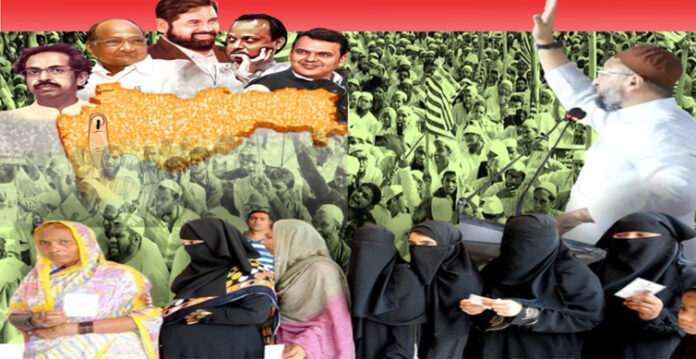Maharashtra is set to hold its legislative assembly elections on November 20, 2024, for all 288 seats, with the results expected on November 23. This time, a total of 4,136 candidates, including 420 Muslim candidates, are vying for a place in the assembly. Most political parties, with the exception of the BJP, have fielded Muslim candidates.
Notably, the alliance partners in Maharashtra’s Grand Alliance, including Eknath Shinde’s Shiv Sena and Ajit Pawar’s NCP, have shown support for Muslim candidates, along with Congress, Uddhav Thackeray’s Shiv Sena (UBT), and Sharad Pawar’s NCP. Other parties, such as Asaduddin Owaisi’s AIMIM and the Samajwadi Party (SP), have also nominated Muslim candidates in an effort to bolster their political foothold in the state.
Muslims make up around 12 percent of Maharashtra’s voter base, exerting a significant political influence on 38 key seats out of the 288 assembly seats. Among these, certain constituencies like Malegaon, where Muslims comprise nearly 60 percent of the electorate, and nine others with over 40 percent Muslim voters, are especially critical. Despite their strong presence, Muslim candidates have historically struggled to win more than 13 seats, with the record set in the 1972, 1980, and 1993 elections. This year, many hope to break this record.
Parties and Alliances with Muslim Candidates
The Grand Alliance, led by Congress, Shiv Sena (UBT), and NCP, has fielded 14 Muslim candidates. Congress, which leads the alliance, has nominated nine Muslim candidates out of its 101 assembly seats. Uddhav Thackeray’s Shiv Sena (UBT) has put forward one candidate, Haroon Khan, contesting from Mumbai’s Versova seat, while Sharad Pawar’s NCP has fielded four Muslim candidates across Mumbai, Vidarbha, and Marathwada.
Eknath Shinde’s Shiv Sena, an ally in the Maha Vikas Aghadi alliance, has also fielded two Muslim candidates, including Abdul Sattar from the Sillod constituency. Ajit Pawar’s faction of the NCP, another Grand Alliance partner, nominated five Muslim candidates, including prominent names like Nazim Ullah from Mumbra, Nawab Malik from Mankhurd Nagar, and Zeeshan Siddiqui from Bandra East. Ajit Pawar claims that his party has aimed to allot 10 percent of tickets to Muslim candidates.
AIMIM and SP Push for Muslim Representation
AIMIM, led by Asaduddin Owaisi, has taken a strong stance by nominating 16 candidates in Maharashtra, with 12 of them being Muslim. This move marks AIMIM’s commitment to strengthening its base in the state. The Samajwadi Party, another prominent player among Muslim voters, has nominated six Muslim candidates out of its eight contested seats.
Independent Muslim Candidates
With large political parties having only partially accommodated Muslim representation, 218 Muslim candidates have decided to contest independently. In Malegaon, the state’s most Muslim-populated city, 13 Muslim candidates are running, while in Sambhaji Nagar East, 17 Muslim candidates, including three women, are in the race.
This election season also sees 22 Muslim women candidates competing across the state, marking a step forward in gender representation within the Muslim community.
A Record-Breaking Election?
Historically, Muslim candidates in Maharashtra have found it challenging to exceed a winning count of 13 seats. Despite Muslims comprising 12 percent of the population, the percentage of Muslim MLAs has hovered below 10 percent, with only 10 MLAs securing seats in the 2019 elections. Since 1962, when 11 Muslim candidates won, the figure has rarely breached double digits.
In the current landscape, with Muslim voters holding sway in at least 60 constituencies and multiple political alliances endorsing Muslim candidates, there is a possibility of surpassing the historical record of 13 seats. The political weight of Muslim voters has been acknowledged even by BJP leaders, who have cited the influence of the Dalit-Muslim voter alliance as a contributing factor to past electoral setbacks for the BJP in Maharashtra.
As Maharashtra heads to the polls, the focus remains on whether this election will usher in a new era of Muslim representation or if it will echo the electoral patterns of the past. For now, political analysts and voters alike are closely watching the performance of these 420 Muslim candidates, many of whom are optimistic about rewriting the history of Maharashtra’s assembly.
(This story is sourced from a third-party syndicated feed. Raavi Media takes no responsibility or liability of any nature. Raavi Media management/ythisnews.com can alter or delete the content without notice for any reason.)


